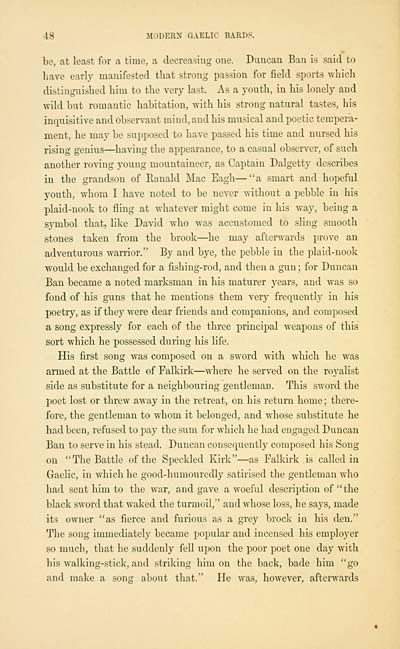Download files
Complete book:
Individual page:
Thumbnail gallery: Grid view | List view

18 MODERN GAELIC BARD*.
be, .at least for a time, a decreasing one. Duncan Ban i.s said to
have early manifested that strong passion for field sports which
distinguished him to the very last. As a youth, in his lonely and
wild but romantic habitation, with his strong natural tastes, his
inquisitive and observant mind, and his musical and poetic tempera-
ment, he may be supposed to have passed his time and nursed his
rising genius — having the appearance, to a casual observer, of such
another roving young mountaineer, as Captain Dalgetty describes
in the grandson of Ranald Mac Eagh — "a smart and hopeful
youth, whom I have noted to be never without a pebble in his
plaid-nook to fling at whatever might come in his way, being a
symbol that, like David who was accustomed to sling smooth
stones taken from the brook — he may afterwards prove an
adventurous warrior." By and bye, the pebble in the plaid-nook
would be exchanged for a fishing-rod, and then a gun; for Duncan
Ban became a noted marksman in his maturer years, and was so
fond of his guns that he mentions them very frequently in his
poetry, as if they were dear friends and companions, and composed
a song expressly for each of the three principal weapons of this
sort which he possessed during his life.
His first song was composed on a sword with which he was
armed at the Battle of Falkirk — where he served on the royalist
side as substitute for a neighbouring gentleman. This sword the
poet lost or threw away in the retreat, en his return home; there-
fore, the gentleman to whom it belonged, and whose substitute he
had been, refused to pay the sum for which he had engaged Duncan
Ban to serve in his stead. Duncan consequently composed his Song
on "The Battle of the Speckled Kirk" — as Falkirk is called in
Gaelic, in which he good-humouredly satirised the gentleman who
had sent him to the war, and gave a woeful description of "the
black sword that waked the turmoil," and whose loss, he says, made
its owner "as fierce and furious as a grey brock in his den."
The song immediately became popular and incensed his employer
so much, that he suddenly fell upon the poor poet one day with
his walking-stick, and striking him on the back, bade him "go
and make a son<? about that." He was, however, afterwards
be, .at least for a time, a decreasing one. Duncan Ban i.s said to
have early manifested that strong passion for field sports which
distinguished him to the very last. As a youth, in his lonely and
wild but romantic habitation, with his strong natural tastes, his
inquisitive and observant mind, and his musical and poetic tempera-
ment, he may be supposed to have passed his time and nursed his
rising genius — having the appearance, to a casual observer, of such
another roving young mountaineer, as Captain Dalgetty describes
in the grandson of Ranald Mac Eagh — "a smart and hopeful
youth, whom I have noted to be never without a pebble in his
plaid-nook to fling at whatever might come in his way, being a
symbol that, like David who was accustomed to sling smooth
stones taken from the brook — he may afterwards prove an
adventurous warrior." By and bye, the pebble in the plaid-nook
would be exchanged for a fishing-rod, and then a gun; for Duncan
Ban became a noted marksman in his maturer years, and was so
fond of his guns that he mentions them very frequently in his
poetry, as if they were dear friends and companions, and composed
a song expressly for each of the three principal weapons of this
sort which he possessed during his life.
His first song was composed on a sword with which he was
armed at the Battle of Falkirk — where he served on the royalist
side as substitute for a neighbouring gentleman. This sword the
poet lost or threw away in the retreat, en his return home; there-
fore, the gentleman to whom it belonged, and whose substitute he
had been, refused to pay the sum for which he had engaged Duncan
Ban to serve in his stead. Duncan consequently composed his Song
on "The Battle of the Speckled Kirk" — as Falkirk is called in
Gaelic, in which he good-humouredly satirised the gentleman who
had sent him to the war, and gave a woeful description of "the
black sword that waked the turmoil," and whose loss, he says, made
its owner "as fierce and furious as a grey brock in his den."
The song immediately became popular and incensed his employer
so much, that he suddenly fell upon the poor poet one day with
his walking-stick, and striking him on the back, bade him "go
and make a son<? about that." He was, however, afterwards
Set display mode to: Large image | Transcription
Images and transcriptions on this page, including medium image downloads, may be used under the Creative Commons Attribution 4.0 International Licence unless otherwise stated. ![]()
| Early Gaelic Book Collections > Blair Collection > Selections from the Gaelic bards > (72) |
|---|
| Permanent URL | https://digital.nls.uk/75750670 |
|---|
| Description | A selection of books from a collection of more than 500 titles, mostly on religious and literary topics. Also includes some material dealing with other Celtic languages and societies. Collection created towards the end of the 19th century by Lady Evelyn Stewart Murray. |
|---|
| Description | Selected items from five 'Special and Named Printed Collections'. Includes books in Gaelic and other Celtic languages, works about the Gaels, their languages, literature, culture and history. |
|---|

